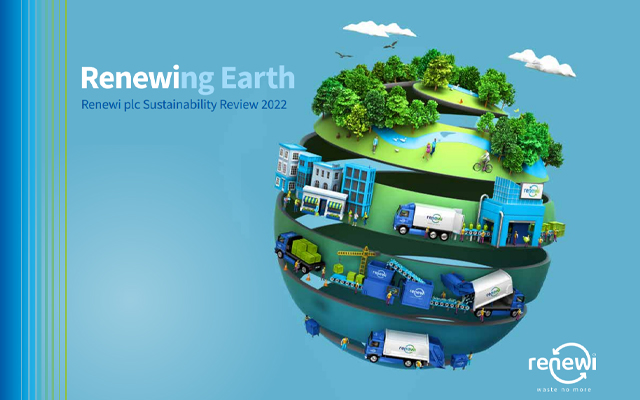Published today: Renewi’s Sustainability Review reveals industry leading ESG performance
05 July 2022

Renewi has today published its Sustainability Review, which outlines the company’s progress towards its sustainability goals and reveals strong progress in ESG performance.*
Renewi plc (LSE: RWI, Euronext: RWI), recycled 67% of the 12.4m tonnes it processed last year, providing 8.4m tonnes of materials for re-use.
ESG highlights include:
- Increase of industry leading recycling rate to 67% (aiming to achieve 75% by the end of 2025), producing more low carbon secondary materials which replace primary alternatives.
- Recycling activities which avoided 3.1 million tonnes of carbon emissions.
- A 36% decrease in the lost time incident frequency rate improving our safety performance from 14 to 9.
Also highlighted is the urgent need for circular economies and responsible waste valorisation to supplement the ongoing energy transition, essential if climate change mitigation targets are to be achieved and the 1.5 °C Paris Agreement goal met.
“Circularity and recycling must be the driving force behind climate action. System changes around the re-use of materials and giving waste a new life is crucial for the transition to a circular economy”, says Otto de Bont, CEO of Renewi. “Sustainability is at the heart of Renewi’s business model. Our purpose, which is to give new life to used materials, enables the circular economy, which is essential if society is to meet its carbon reduction goals,” adds de Bont.
Operating in the world’s most advanced circular economies (the Netherlands and Belgium), provides growing opportunities to invest and form partnerships to recover more materials from waste. Renewi is using increasingly sophisticated sorting and treatment steps to produce valuable low carbon secondary materials.
Particularly in the Benelux, governments, the European Union, corporates and consumers are introducing measures and making changes to help address the climate crisis. In the Sustainability Review, Renewi argues progress should be accelerated.
A circular economy requires partnership, collaboration and major investment in innovative technology. Multiple players working together can identify the necessary measures to replace waste incineration and the linear economy. Remedial solutions include greater sorting and treatment specialisation and ever increasing “valorisation” of waste, to produce better materials for reuse.
Renewi’s three sustainability pillars
Renewi’s sustainability strategy is organised into three pillars: enabling the circular economy by replacing incineration and landfill with recycling, reducing its own carbon emissions and caring for people.
We are ambitious in our sustainability objectives, and to this end we are currently developing a roadmap to reduce scope 1, 2, and 3 emissions towards making a net zero commitment. We are also widening our understanding of climate change beyond carbon and have begun to broaden our sustainability objectives to reflect this.
Optimistic outlook
Renewi is optimistic about the future. We are cognisant of the necessary steps to be taken, and we are playing a leading role. We are at the heart of resource preservation – by replacing incineration and landfill with recycling, we are playing an active role in slowing down global warming. Through partnering with customers and partners to create high quality low carbon secondary materials for use in production, Renewi is helping to tackle the threat of climate change to help improve the health of our planet, for current and future generations.
Learn more about the company’s commitment to act by reading Renewi’s Sustainability Review: Reports and Presentation
* Environmental Social and Governance refers to the criteria used to measure the sustainability and ethical impact of an investment in a business or company. It is a generic term used in capital markets and is commonly used by investors to evaluate the behaviour of companies, referring to a subset of non-financial performance indicators which includes issues like ensuring there are systems in place to ensure accountability and managing a business’s carbon footprint.

